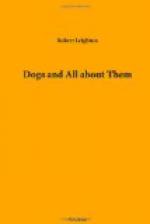This after every liquid motion, or, if the motions may not be observed, three times a day. If blood should appear in the stools give the following: Kino powder, 1 to 10 grains; powder ipecac., 1/4 to 3 grains; powdered opium 1/2 to 2 grains. This may be made into a bolus with any simple extract, and given three times a day.
The food is of importance. The diet should be changed; the food requires to be of a non-stimulating kind, no meat being allowed, but milk and bread, sago, or arrowroot or rice, etc. The drink either pure water, with a pinch or two of chlorate and nitrate of potash in it, or patent barley-water if the dog will take it.
The bed must be warm and clean, and free from draughts, and, in all cases of diarrhoea, one cannot be too particular with the cleanliness and disinfection of the kennels.
CONSTIPATION,
more commonly called costiveness, is also a very common complaint. It often occurs in the progress of other diseases, but is just as often a separate ailment.
Perhaps no complaint to which our canine friends are liable is less understood by the non-professional dog doctor and by dog owners themselves. Often caused by weakness in the coats of the intestine. The exhibition of purgatives can only have a temporary effect in relieving the symptoms, and is certain to be followed by reaction, and consequently by further debility. Want of exercise and bath common cause.
Youatt was never more correct in his life than when he said: “Many dogs have a dry constipated habit, often greatly increased by the bones on which they are fed. This favours the disposition to mange, etc. It produces indigestion, encourages worms, blackens the teeth, and causes fetid breath.”
Symptoms—The stools are hard, usually in large round balls, and defecation is accomplished with great difficulty, the animal often having to try several times before he succeeds in effecting the act, and this only after the most acute suffering. The faeces are generally covered with white mucus, showing the heat and semi-dry condition of the gut. The stool is sometimes so dry as to fall to pieces like so much oatmeal.
There is generally also a deficiency of bile in the motions, and, in addition to simple costiveness, we have more or less loss of appetite, with a too pale tongue, dullness, and sleepiness, with slight redness of the conjunctiva. Sometimes constipation alternates with diarrhoea, the food being improperly commingled with the gastric and other juices, ferments, spoils, and becomes, instead of healthy blood-producing chyme, an irritant purgative.
Treatment—Hygienic treatment more than medicinal. Mild doses of castor oil, compound rhubarb pill, or olive oil, may at first be necessary. Sometimes an enema will be required if the medicine will not act.
Plenty of exercise and a swim daily (with a good run after the swim), or instead of the swim a bucket bath—water thrown over the dog.




